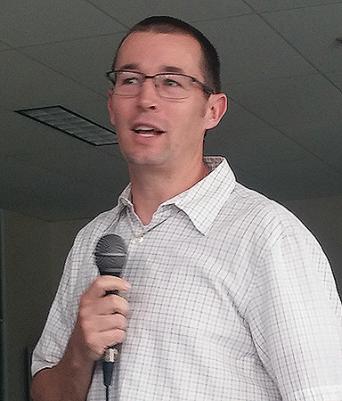
Is Fair Trade Worth It? He Thinks So

In studying consumer behavior, sociologist Keith Brown has encountered all the arguments that fair trade campaigns and “ethical shopping” don’t really cut it.
Economists say fair trade distorts prices. Psychologists say it just lets buyers let themselves off the hook. Activists say personal shopping is no substitute for collective action.
For individuals, fair trade can be expensive — and guilt-inducing. Is there really any point to buying $1.29 oranges if you end up getting your kids’ T-shirts at Walmart so you can afford them? Then there’s the whole problem of sounding preachy.
Don’t worry, keep shopping, says Brown, an associate professor at St. Joseph’s University, author of “Buying into Fair Trade: Culture, Morality and Consumption” (2013)and Weavers Way Working Member.
“Is fair trade worth it? I can say without a doubt it’s meaningful, without a doubt it’s important. It will never change the relationship between rich and poor countries. It’s not a radical solution to global poverty by any means, but it is reformist and it is making change and we are seeing tens of millions of dollars going back to producers.”
In his work on consumer culture — “I’m interested in what drives people to become ethical consumers, what drives you to create change through shopping” — Brown interviewed coffee and handicraft consumers in Philadelphia and nationally. “One of the first things I found was the same narrative over and over from diehard fair traders: ‘I went to a developing country and I had meals with people, I spent time on farms.’ And this experience was very powerful.”
Market research puts these deeply committed folks at 4-15 percent of those who identify as ethical shoppers. For the rest of us, it’s more complicated. Not just because of cost, but also because of all the fair trade-certifying organizations that have popped up over the last 20 years. “It’s led to a lot of confusion and problems,” Brown admitted. “But its also inspiring and great, if you look at fair trade as more of a social movement.”
As for the academic critiques, he’s not impressed by economists’ argument that fair trade creates artificially high prices that, say, encourage coffee farmers to plant too much coffee. “This doesn’t hold water in practice, because only 20 percent of the coffee produced under fair trade conditions is actually sold at fair trade prices,” he said. “Second, farmers aren’t stupid. They understand that if they grow only one thing it subjects them to price fluctuation risks. They don’t need westerners to tell them that.” But fair trade organizations can and do help them access global markets.
The psychological argument, that people who stock up on fair trade cocoa then feel OK about buying sweatshop sneaks, does play out in experimental studies. “But in the real world, we see consumers are aware of this. They joke about it: ‘I do this so I can do that, but at least I’m trying.’ They view it as part of a process.”
As to whether individual consuming makes a difference, he pointed to the recent unpleasantness at United Airlines, as well as the existence of organizations like Weavers Way. “Political scientists talk about the push and pull of markets,” he said. “Shopping is a social process. We create communities around brands, around products, and the sense of ‘we-ness’ that develops when they push and we push back does produce collective results.”
